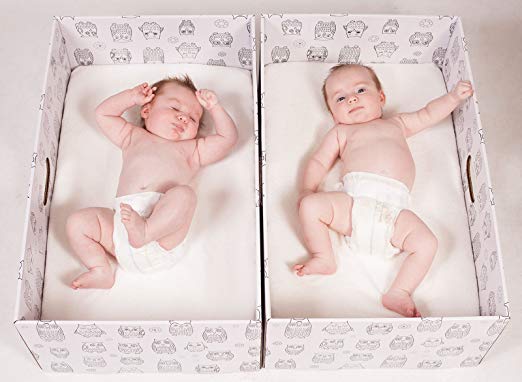
Baby Boxes
Price $99
BUY NOW Pip & Grow Amazon FinbinnA baby box is a simple, solid, green solution for a newborn bassinet, with a neat historical component.
Perhaps this is just my personal taste, but I think a baby box is quite visually appealing. The “designs,” if you can call them that — I mean, they’re boxes — are basic and clean. Compared to many other baby products that tend to be big, loud, and flashy, baby boxes are understated, mature, and cosmopolitan… they don’t necessarily scream “baby” when you see them.
Plus – I don’t know exactly what it is about these boxes, but babies just look adorable in them. Like, can’t-look-away, irresistible adorable. So there’s that.
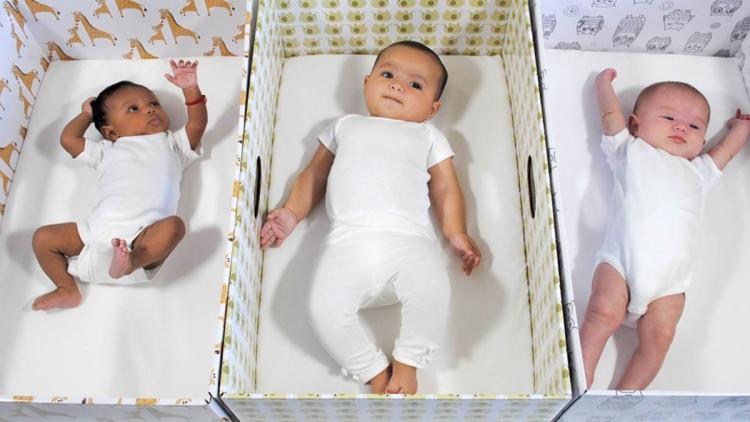
A Bit of History
Following on the heels of a media storm covering Finnish baby boxes (and the impressively-low infant mortality rates in Finland) a few years back, a number of entrepreneurs and engineers teamed up to adapt similar programs to the US.
But here’s the interesting thing: the boxes themselves have very little to do with Finland’s infant mortality rate; it’s really about access to prenatal health and maternity care (and that’s a conversation for another day).
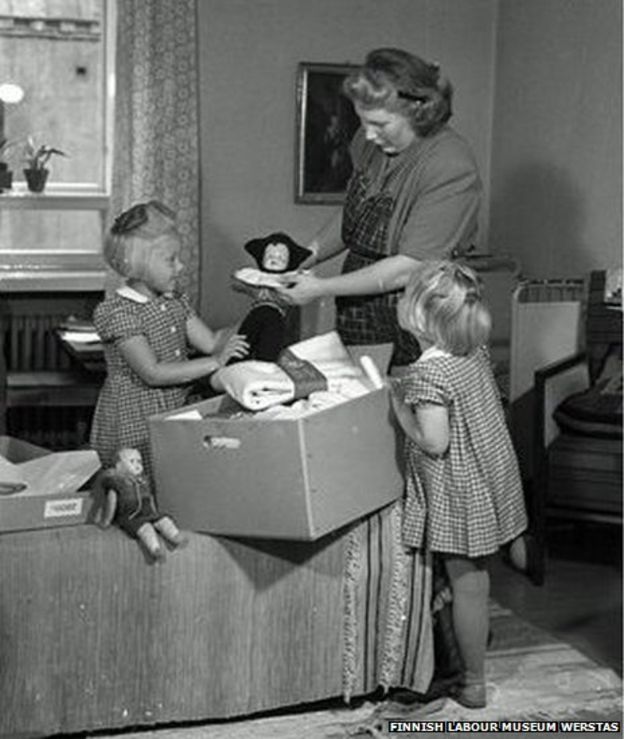
The most important component of the baby box tradition is not the baby box itself, but the health care, information, and education that goes along with each one. The mission is to use baby boxes as a mechanism to extend information and education about safe sleep.
“The baby box program is a beautiful tradition.”
Jennifer Clary, Co-founder of The Baby Box Co.
Big Picture
As of 2021, the two leading baby box companies are Pip & Grow (~$59) and Finnbin (~$100). (Note: the Baby Box Co. baby boxes are no longer available.)
We’ll tell you more about the organizations shortly — and they do have notable differences in their operations as well as their priorities — but for the most part, the products are functionally the same. Thus, you can expect your experience using a baby box as a bassinet to look and feel pretty similar, regardless of which brand you end up going with.
Pip & Grow and Finnbin each have their own recipe for community health. In some areas, they’ve partnered with hospitals to provide baby boxes free of charge to families in need. In others, they’ve teamed with local non-profits to offer boxes at a discounted rate. And they’re advocating for safe sleep education — providing safe sleep tutorials and information for parents online.
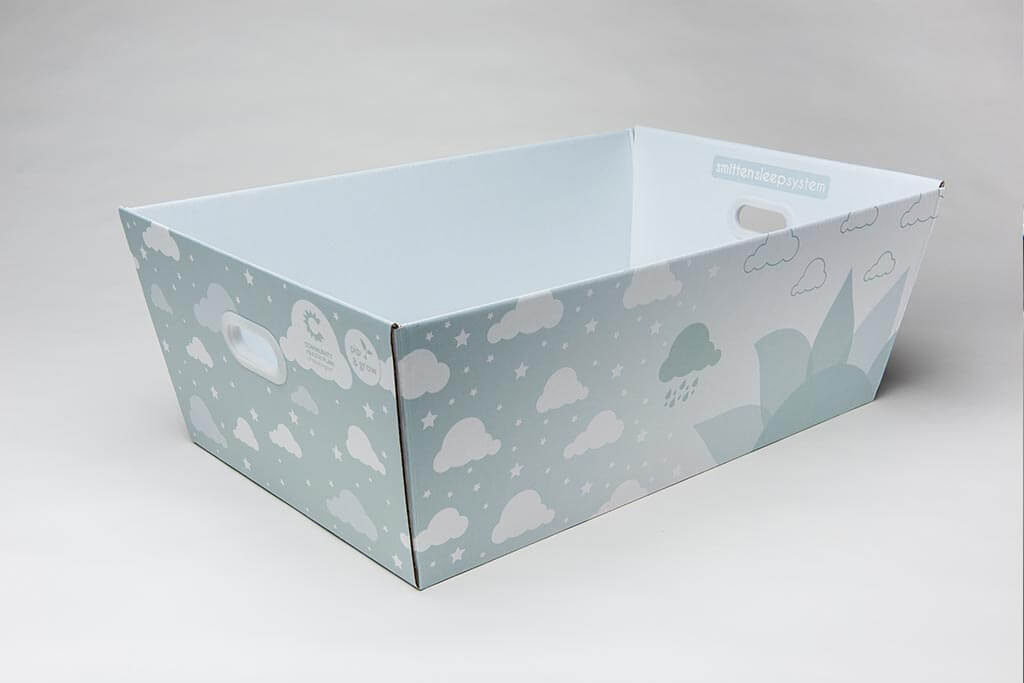
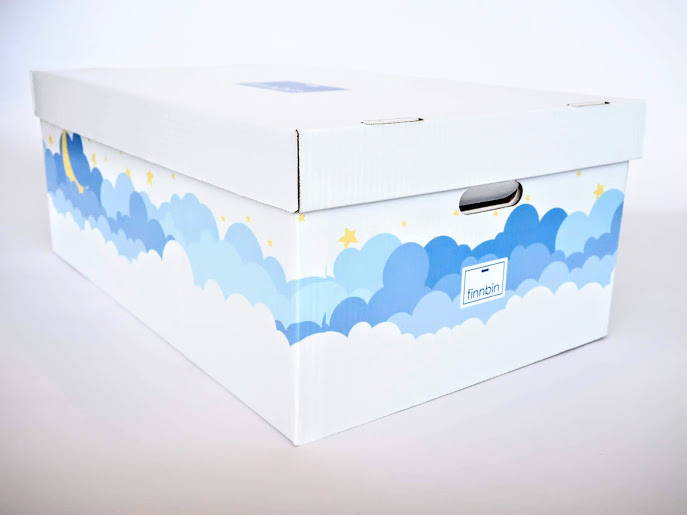
Baby boxes were on the fringe even a few years ago, but we’re glad to report that they’re making the jump into mainstream baby gear.
In fact, they’ve grown in popularity to the extent that they’ve come in for some flak recently from skeptics who question the products and their safety, on the grounds that “we don’t have any data on baby boxes yet.” (The CPSC is currently developing separate standards for baby boxes, btw, because technically baby boxes don’t really fall into a neat category for product standards/regulations.) But these companies have done their homework, and their products have passed every category for the Consumer Product Safety Commission’s testing and standards for bassinets.
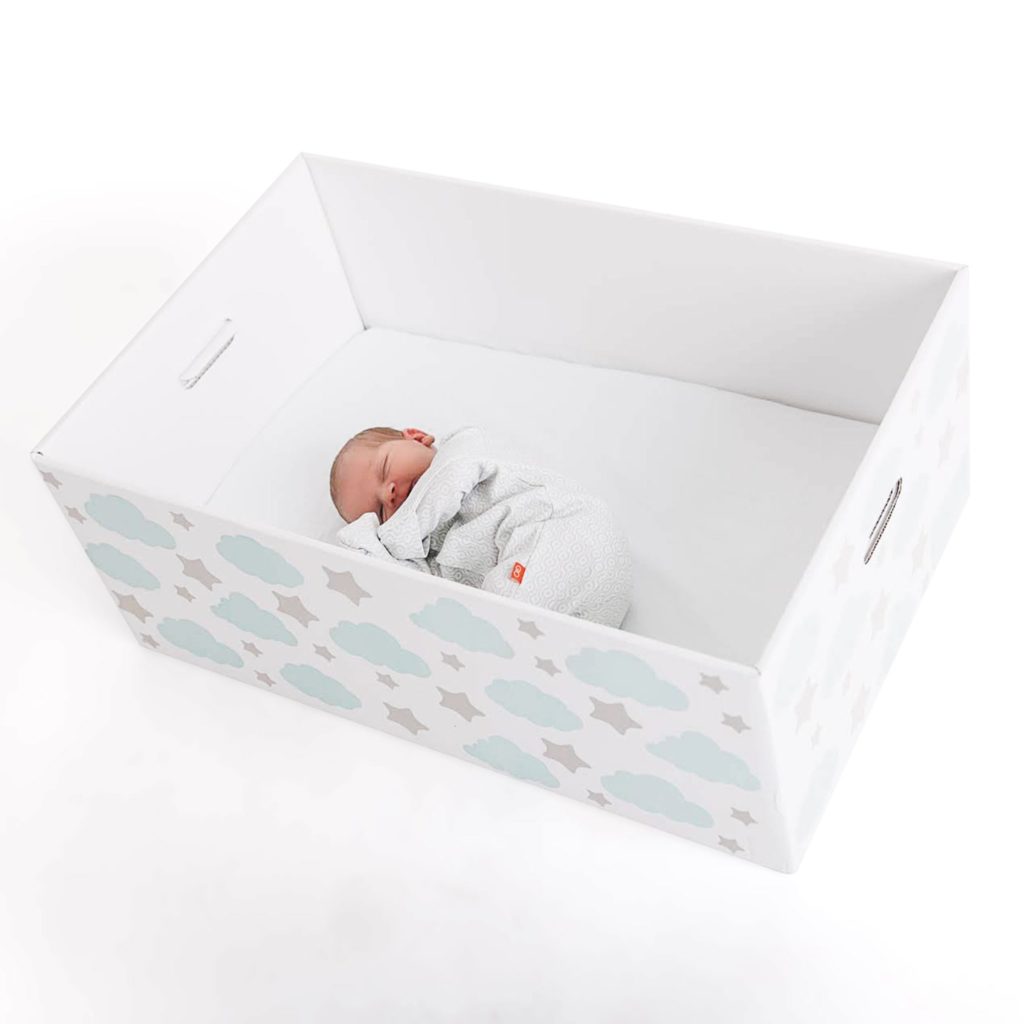
None of these companies are purporting that baby boxes are the be-all-end-all when it comes to safe sleep – far from it. When I asked The Baby Box Co.’s founder, Jennifer Clary, what she would say to critics who think the boxes have come into widespread use too quickly, she intimated that they’re having the wrong conversation: “The box is just an inanimate object,” she told me. “When it’s used correctly, it’s SAFE. But it’s all about how you use it.” So is every other bassinet, which is why baby box developers are so passionate about safe sleep. Their mainstay is about education and information, not just a product.
Baby boxes should be used in the same way as any other bassinet or crib. You can check out the AAP’s safe sleep guidelines for specific details; the gist is to always lay baby down on his back (on his flat, firm surface) and keep the sleeping space completely clear — no blankets, stuffed animals, pillows, etc.
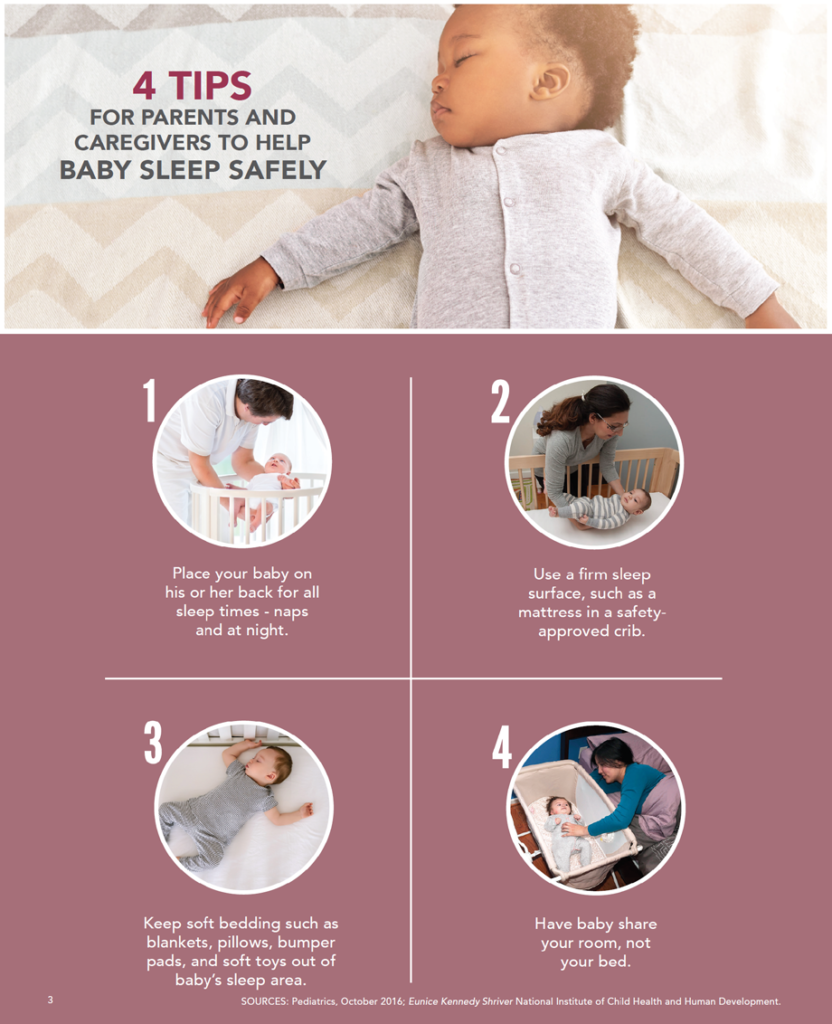
Side note: I spent upwards of six years researching SIDS science and the history of ideas about “safe sleep,” and I think the baby boxes are an exciting development in the world of babies and sleep. I’m a born skeptic – I always want more data, more answers, more information – and personally, I’m convinced that baby boxes can be a safe place for babies. I used one with my newborn daughter, and we both slept great.
Pros and Cons
Pros
Baby boxes have a lot going for them. They’re safe, simple, and ultra-portable. There is NO setup, and they’re crazy easy to use. They’re great for families who travel by car, and they are incredibly green.
Indeed, a baby box is perfect for car trips – it can double as baby’s suitcase! Simply load up the box with your stuff, throw it in the car, and you have your baby’s bed – complete with all its familiarity and smells – packed for your trip.
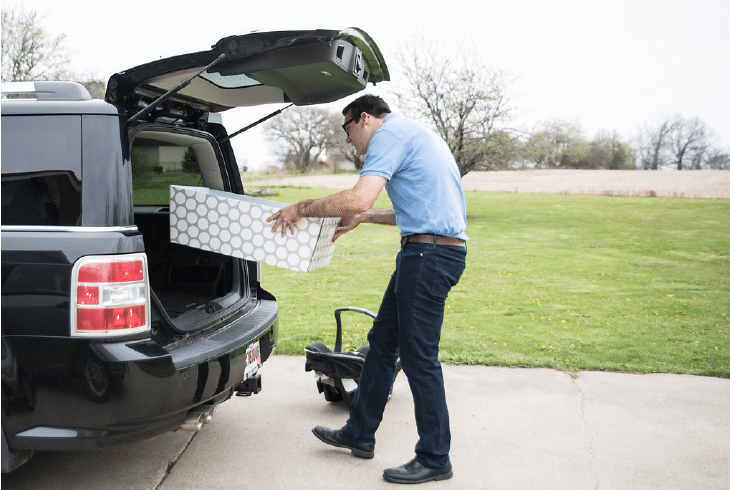
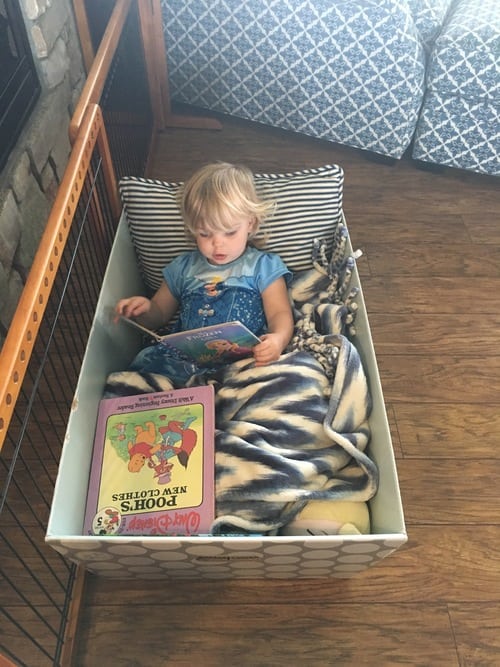
I also LOVE that baby boxes are recyclable and can easily be repurposed for toddlers (as toy boxes, spaceships, doll beds, etc.) or for any number of other storage/organizational uses. And you probably will want to keep it, since the box itself is surprisingly durable and sturdy.
The companies behind baby boxes are all civic-minded organizations doing what they can to make a positive impact both on families’ everyday lives and on the nation’s public health. Very cool, right?
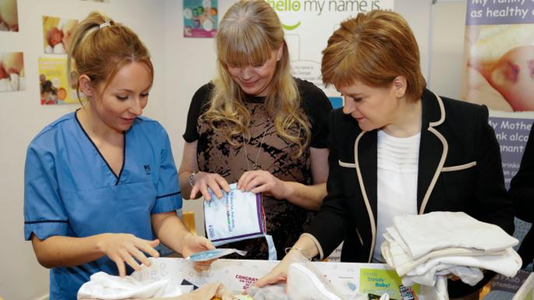
They also appreciate data. And science. (Love this!)
Cons
There are a couple of drawbacks. The major downside of any baby box is that it’s (best) placed on the floor. This is because putting it on top of a surface could pose a fall hazard. Translation: a baby box can sometimes be an inconvenient bassinet.
Scooping a baby up from the floor might not seem like that big of a deal, but when your postpartum, depleted, never-knew-this-kind-of-exhaustion-existed body has to squat or crouch down multiple times in the middle of the night to pick up your baby, then tell me what you think. It may not be the end of the world, but it’s a huge PITA.
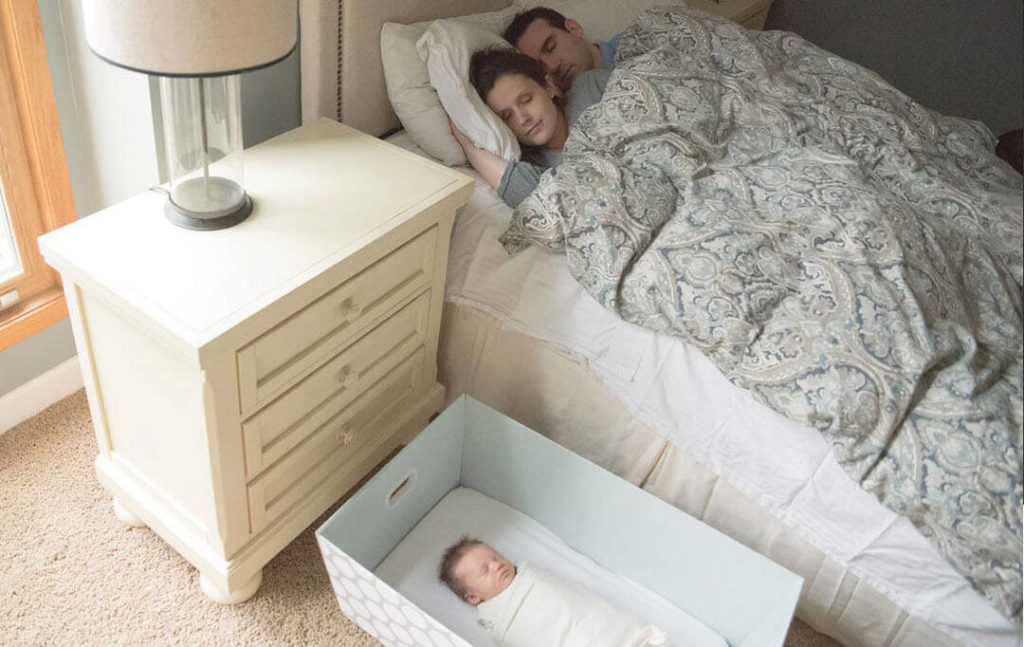
Pip & Grow has a baby box stand in the works — it’s currently available for pre-order and set to be released soon. We’ve seen it in action, and it’s great (plus it has bonus storage!). We hope Finnbin looks to develop something similar, too, because the stand would make a baby box WAY more user- and new mom-friendly.
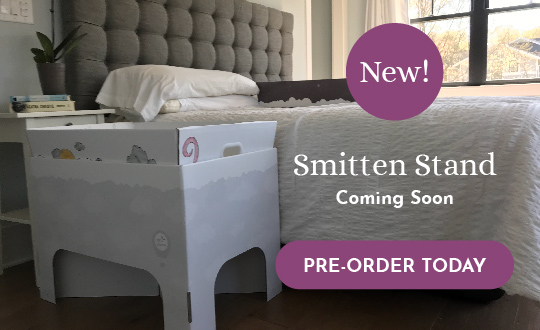
During the day, if you’re using a baby box in different areas of your home, you might need to keep it out of reach of dogs/pets or other children (ahem, toddlers) who might try to drag the box around, get inside with baby, or pile every blanket in the house on top of it without you noticing (not that any of this happened to me, of course).
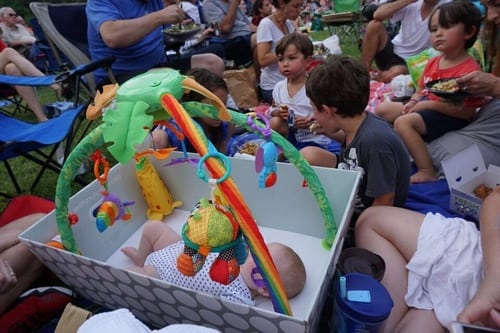
Another potential disadvantage to the baby box is that the sides aren’t see-through, as is the case with some bassinets. There’s nothing wrong with this, per se, but it’s something worth noting.
Lastly, although these boxes are carefully designed for durability, if they get drenched with water — say, your toddler pours the dog’s water bowl in there in an attempt to turn the thing into a bathtub — you’re going to have a problem.
A little more on the companies…
- Pip & Grow is doing great work with baby boxes. Its “smitten bassinet” is 100% sourced and manufactured in the U.S., and the box itself is made from 30% post-recycle corrugate. Every Smitten Bassinet ($50 and up) comes with a 1” customized Certi-PUR foam mattress with a BPA and phthalate-free waterproof cover, as well as one cotton fitted sheet. (Extra sheets are $15 each.)
The Pip & Grow baby box does ship collapsed, so it needs to be assembled. Pip & Grow is unique for two of its offerings beyond the baby box: the Smitten Sleeper is an in-bed sleeper designed for parents who want to bed-share; and Pip & Grow’s baby box bassinet, the Smitten Stand, is coming out soon — this simple modification makes baby boxes SO much more practical.
- Finnbin’s Baby Box Boxinet ($95 and up) is entirely made and produced in the USA. It features double-walled corrugated cardboard sourced specifically from responsibly-maintained forestries and is 100% recyclable. (FYI, Finnbin is very passionate about its materials — when I spoke with founder Shawn Bercuson, he explained to me that not all cardboard is created equal.)
The standard Finnbin Boxinet package comes with a lid (not to be used with baby inside — the lid’s predominant purpose is to protect the box during shipping), a Certi-PUR waterproof mattress, and a cotton sheet. (Extra sheets are available for $13 each.) *Finnbin’s baby box bundles also come stocked up with other newborn necessities, ranging from bottles and diapers to thermometers, books, and clothes (depending on which package you select). This company produces a high-quality baby box and doesn’t cut corners — it’s really committed to sustainability and safe sleep.
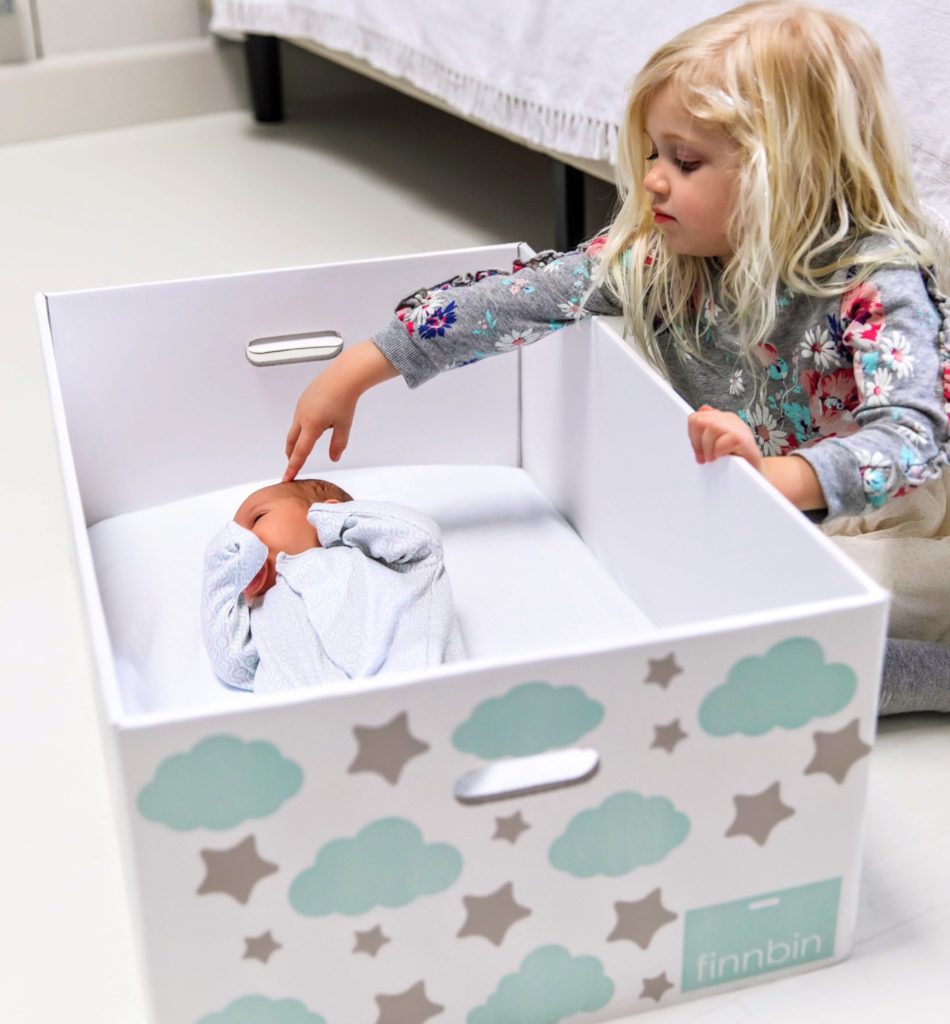
Bottom Line: I loved having the baby box around – it’s safe, simple, aesthetically pleasing and convenient. It’s a wonderful (car) travel bassinet and incredibly portable around the house, besides being environmentally-friendly. I would 100% recommend considering a baby box for your newborn sleep solution. Honestly, even if you already have a bedside bassinet, it’s nice to have a baby box as a secondary/travel option. Although the price may seem steep for a cardboard box, this is actually one of, if not the, most economical newborn sleeping arrangements.
nice
Steph,
That’s so disappointing to hear, and thank you for sharing your experience. We’ll be looking into this.
Hi Brit,
I received the following notice today regarding the liquidation of the Baby Box Co: https://www.abc-claims.com/teams/default.asp?u=ROCKCREEKFA&s=htosports&p=custom&pagename=Baby+Box+Info
Claims need to be filed online for customers to try to receive their money back for ordered boxes.
Thanks for the update, Steph!
I never received a babybox from BabyBoxCo, despite having ordered it months ago and all inquiries to the company go unanswered. Customers should beware and review its incredibly low ratings due to complete lack of order fulfillment and no communication: https://www.trustpilot.com/review/www.babyboxco.com
I have a baby box from my son born three years ago. We are going to use it for this baby boy on the way! I can’t find anywhere to buy sheets for Baby Box brand box and it looks like the other baby boxes on the market are not the same size…could you please tell me where I can buy a sheet that will fit the original Baby Box company’s mattress?
Hi, Holly — I’m not sure there’s anywhere you could purchase a Baby Box Co. sheet at this point (to my knowledge). One hack may be to see if a fitted diaper pad sheet would do the trick, or a pillow case. Good luck!
Hi Brit, thanks for the great info! For how long can a baby sleep in one of these boxes as his primary overnight bed? ie, when does a baby/infant/(toddler??) outgrow this box?
Thanks!
Kat — Sorry I missed this! The general advice is that once your baby can pull up, they’ve outgrown the baby box (so it definitely wouldn’t last until toddlerhood). Let me know if you have other questions 🙂
My friend received one of these in the hospital. I was totally appalled by it. Putting a baby in box and on the floor…that is treating them as though they are a dog. That is crazy. I co-slept with my son, breastfeeding him in the middle of the night was so easy. He was fine and is 21 now.
As a medical doctor, I’m appalled that you shared a bed with an infant. Both the American Academy of Pediatrics (AAP) and the US Consumer Product Safety Commission strongly recommend against bed-sharing with an infant. These boxes drastically reduced the incidence of Sudden Infant Death Syndrome (SIDS), conversely bed-sharing increases the risk about 5 fold.